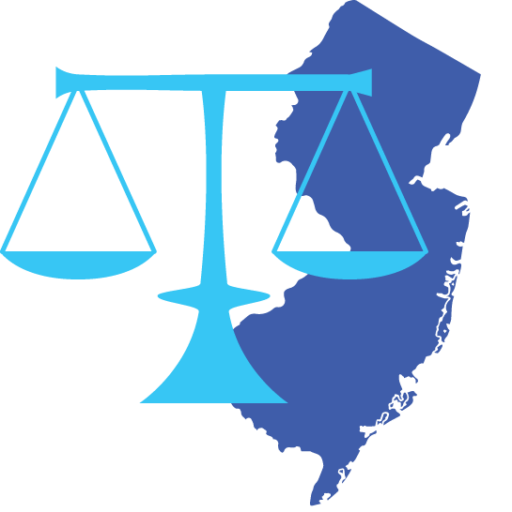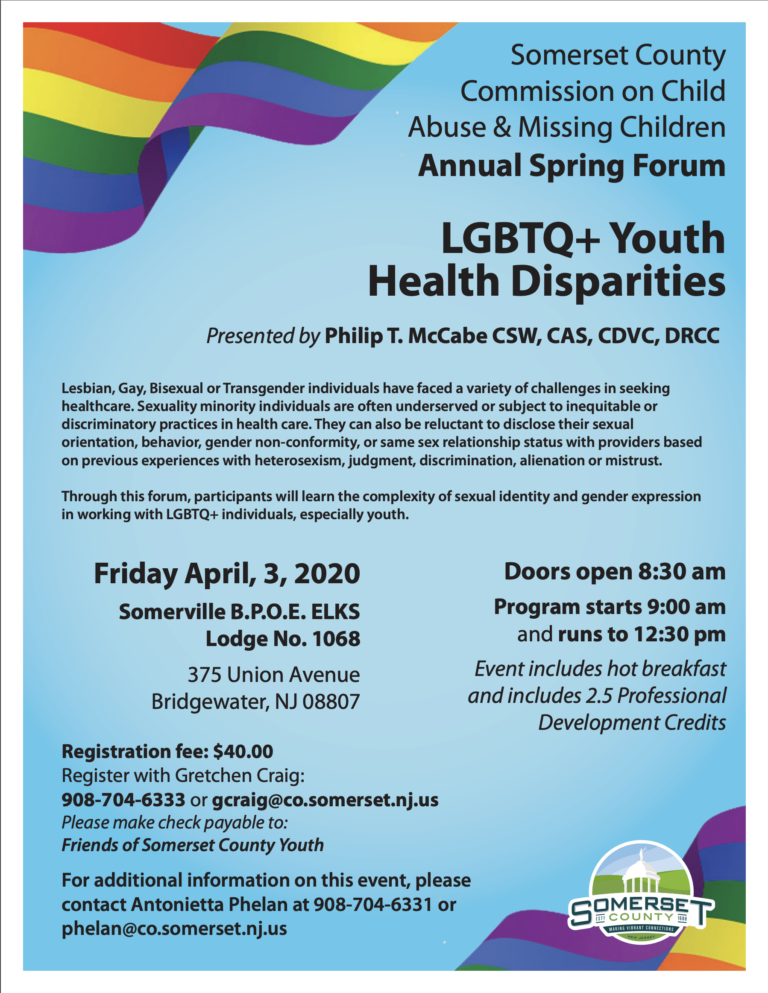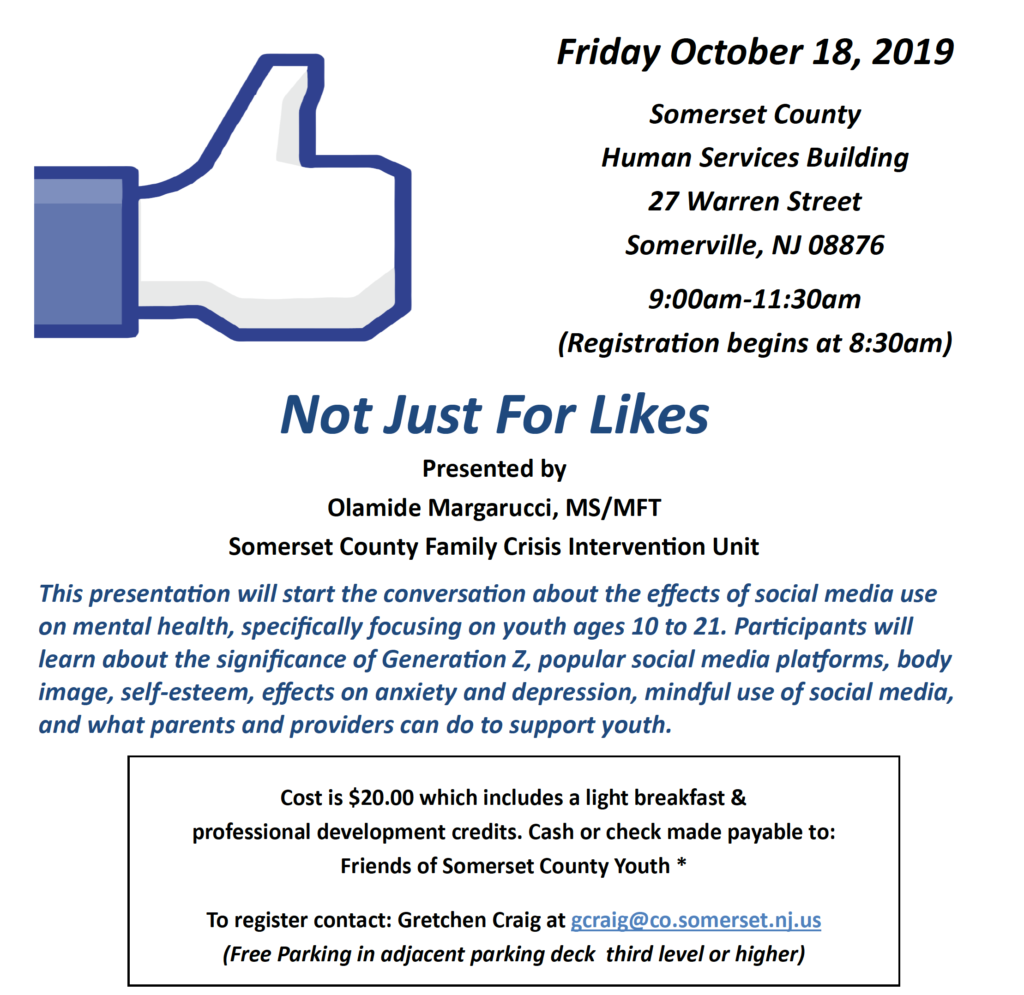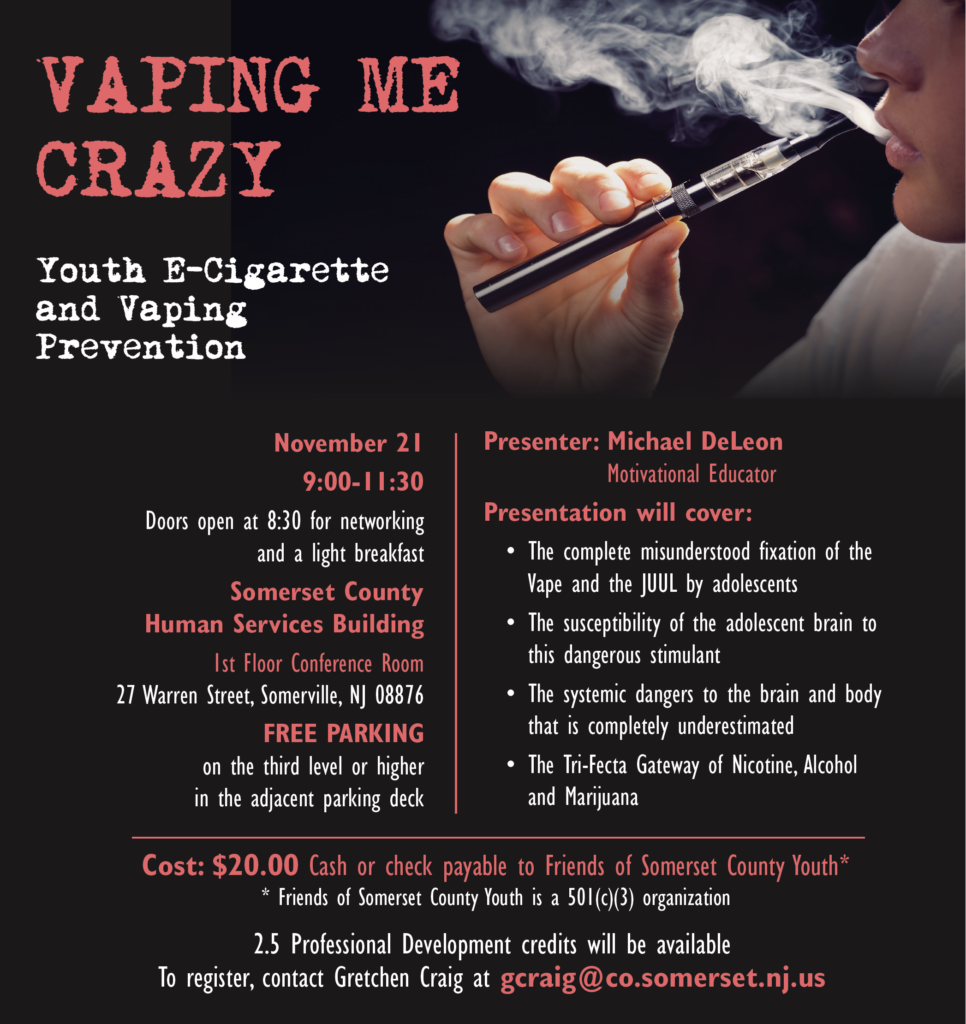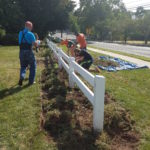SOMERSET COUNTY
About Us
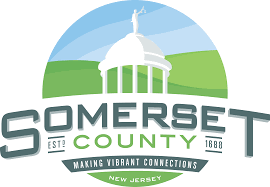
The Somerset County Youth Services Commission, established in accordance with N.J.S.A. 52:17b-169, the law that reformed New Jersey’s juvenile justice system in 1995, was appointed by the Somerset County Board of Chosen Freeholders as the designated planning body for the County’s court involved and at-risk youth. The Commission is charged with the task of defining this troubled population in order to assess their needs and develop programs and services to meet these needs. This process is accomplished by bringing together leaders from a variety of disciplines and engaging them in a proactive group process to focus on examining the needs of our troubled youth, developing solutions in the service delivery system, sharing the system so that it can be truly effective and planning for the future to benefit all of our county’s youth.
Contact Us
Antonietta B. Phelan, M.A.
Principal Program Director
Somerset County Office of Youth Services
P.O. Box 3000
Somerville, NJ 08876
Phone: 908.704.6331
Fax: 908.253.0180
Email: [email protected]
Overview
The Somerset County Youth Services Commission was established in 1981 as part of a pilot project at the State, County and Municipal levels in an effort to improve the juvenile justice system and the provision of services to youth involved with or at risk of involvement with that system. In 1982, the Commission formally assumed the status of the Citizens Advisory Committee as required under that year’s Family Court legislation.
The Commission is governed by a set of by-laws and has established a mission statement and governing principles. The Commission is co-chaired by the Superior Court Judge, who hears Family Court matters and a Freeholder. Their active participatory role in the process includes the appointment of Committees to study particular issues as well as the designation of Commission members to serve on these Committees.
The committees of the Somerset County Youth Services Commission, expanded by professionals in the field and consumers who have particular expertise in the specific topic area, come together on a regular basis to study issues, share ideas and create diverse, comprehensive and innovative approaches to dealing with the problems of youth and their families. Their progress is reported at monthly Commission meetings where the insights and suggestions of other Commission members are offered. Working together in this cooperative, coordinated manner, committees frequently join forces to resolve particular issues or one committee may turn a particular issue over to another committee working on that specific problem.
Past Events
Click event image to download the flyer
Guiding Principles
Valuing Youth
We believe advocates for youth have an obligation to educate and encourage policymakers to be active in acknowledging, protecting and enhancing the value of youth to the nation.
Empowering Youth
We believe young people must be seen as full-fledged citizens of our world. Youth empowerment, the act of bringing out natural talents and energies of youth, is effective when youth join in partnerships with adults. Youth can increase individual self-worth and skills and help build essential social services while having a significant impact on services to communities, states and nation.
Youth should be active participants in decisions affecting their lives, including their living situations. Further, the involvement of young people in the planning and implementation of services and in mobilizing community support for programs that affect their lives and those of their families is essential to their individual development and the success of the programs working with them.
Strengthening Families
We believe families are the foundation of our youth and society. Further, youth thrive when positive change is effected in the family context. The primary function of the family, at a minimum, is to protect, nurture and educate children. Often, for many reasons, families are challenged in this role. We, then, must acknowledge and build on existing family strengths, with the primary objective of unifying families. We recognize that a family environment is the most appropriate setting for youth.
The Somerset County Youth Services Commission is committed to strengthening networking activities at local, state, regional and national levels. Reciprocity, diverse representation, mutual respect, uninhibited communication and leadership are essential elements of dynamic networking.
Youth/Adult Partnerships
We believe youth/adult partnerships play a very important role in achieving the goals of organizations working with, and on behalf of, youth and families. These dynamic, interactive relationships are built by people acknowledging and honoring each other’s uniqueness while striving for balance between their different attributes in order to achieve a common goal.
Youth/adult partnerships recognize that people of all ages are inherently worthy and that they should strive to value this within themselves and one another.
Access to Services
We believe in encouraging access to existing services to overcome barriers, such as language, geography, culture or finances.
Community-Based Youth Development Programs
We believe that it is necessary to incorporate activities that foster relationships between positive adult role models and youth, provide age-appropriate activities, engage youth in, and promote, positive youth development, including activities such as:
- youth clubs, character development activities, mentoring, community service, leadership development, literacy and educational tutoring;
- workforce readiness, peer counseling, fine and performing arts;
- and camping and environmental education, cultural enrichment, risk avoidance programs, academic enrichment, and participant-defined special interest groups, courses or club.
We also believe in employing strong outreach efforts to engage the participation of a wide range of youth, families and service providers.
Mission Statement
Historical Overview
The Somerset County Youth Services Commission was created in 1981 as part of a pilot project at the State, County and Municipal levels in an effort to improve the juvenile justice system and the provision of services to youth involved or at risk of involvement with that system. The objective of this project was to bring together the chief administrators and officials of the court, law enforcement, education and social and human service systems to identify the specific nature of juvenile offenses, determine what services were needed to enhance the functioning of the system and examine ways in which these services could be provided in a coordinated manner.
Funding for staff to coordinate this project at the County level was provided though a State Law Enforcement Planning Agency (SLEPA) grant. After the first year, when the SLEPA funding for the pilot project expired, the Somerset County Youth Services Commission was established as a separate department of county government under the Somerset County Board of Chosen Freeholders and a set of bylaws was formally drawn up and adopted.
With the enactment of Family Court legislation in 1982, the State recognized the need to formalize and institutionalize the relationship between the court and provider agencies that had already taken place in Somerset County under the auspices of the Youth Services Commission and called for a citizens advisory committee in every county to develop and submit to the Commissioner of the New Jersey Department of Human Services “a plan for the provision of community services and programs to meet the needs of children under the jurisdiction of the Family Court.” Since the Youth Services Commission was already performing that planning function in Somerset County, the Commissioner of the State Department of Human Services, in conjunction with the Chief Justice of the New Jersey Supreme Court and the Attorney General, asked the County Board of Chosen Freeholders to designate the Commission as the Citizens Advisory Committee.
In November of 1982, the Commission formally assumed the status of the Citizens Advisory Committee and began work on the development of the comprehensive three- year Youth Services Plan which was presented to the Board of Chosen Freeholders and then forwarded to the State Department of Human Services in March of 1983. Subsequent plans were developed by the Commission in October of 1986, December of 1989 and again in December of 1993.
In December of 1995, Governor Whitman signed a series of bills reforming the juvenile justice system in New Jersey, P.L. 1995, c. 280 through c.284. The reform initiative resulted from recommendations made in 1994 by the Governor’s Advisory Council on Juvenile Justice. In its recommendations, the Governor’s Advisory Council recognized the need to consolidate all aspects of the juvenile justice system, various parts of which then existed under the jurisdiction of the Department of Corrections, the Department of Human Services and the Department of Law and Public Safety, and centralizing authority over juveniles in the justice system in a new agency, the Juvenile Justice Commission.
The Commission was created by N.J.S.A. 52:17B-169 et. seq., in but not of, the Department of Law and Public Safety, as a single agency of State government for the planning, implementation and operation of a comprehensive program of sanctions and services for juveniles to protect the public, ensure accountability and promote rehabilitation of juvenile offenders, with broadly defined powers to accomplish these goals.
The enabling legislation sets forth a thorough recitation of responsibilities relative to the accomplishment of the Commission’s statutory purpose to establish and operate a comprehensive program of sanctions and services and delinquency prevention programs. In furtherance of this goal, the Commission is charged with the Administration of the State/Community Partnership Grant Program, created in N.J.S.A. 52:17B-179.
Programs
Overview
The Partnership Program recognizes that reform of the juvenile justice system involves a collaborative effort between the State and its local communities. The Partnership was established to encourage the development of sanctions and services for juveniles and delinquency prevention programs; increase the range of sanctions and services to youth adjudicated delinquent; reduce overcrowding in the State juvenile institutions and county detention facilities; improve access by minority and female offenders to community-based sanctions and services; expand delinquency prevention programs; and, promote public safety by reducing recidivism. The Partnership program supports the facilities, sanctions and services for juveniles adjudicated or charged as delinquent and delinquency prevention programs through the award of grants allocated to county youth services commissions.
Pursuant to N.J.S.A. 52:17B-180(a), in order to qualify for an award of Partnership Program funds, a county must establish a county youth services commission (hereinafter referred to as “youth services commissions or commissions”) or, with the approval of the Juvenile Justice Commission, identify another local body capable of performing the responsibilities of a youth services commission and must also submit and obtain approval of a comprehensive plan for the delivery of sanctions and services and delinquency prevention programs.
The County Youth Services Commission administers the Partnership program at the county level by using the Youth Services Plan as a basis and makes recommendations to the Board of Chosen Freeholders for the expenditure of funds for services for youth, finds creative means to address youth priorities in such areas as delinquency, substance abuse and truancy, provides input into other county plans for children’s services, monitors the effectiveness of programs for youth and examines the continuum of care for our county’s young people insuring that they will have available to them the resources they need to become healthy and productive citizens.
The Commission is required by the Juvenile Justice Commission to submit a comprehensive plan and application on a three year basis. The purpose of the plan and application is to review specific data along all five points of the continuum to make informed decisions on which prevention and intervention programs to fund that best suits the needs of Somerset County Youth. The commission receives grant funding from the Juvenile Justice Commission in the form of State Community Partnership and Family Court grants.
As of January 1, 2019 the following programs are to be supported through these grants:
Journeys
Journeys is an afterschool prevention program offered by Middle Earth serving youth from Bound Brook, South Bound Brook, Somerville, North Plainfield, Manville and Franklin Township for Somerset County Residents between the ages of 12-17. Youth should demonstrate at –risk behavior such as school avoidance, parent-child conflict, poor school attendance and/or performance, exhibiting maladaptive behaviors that put them at risk of interaction with law enforcement and have a history of acting out in the community. Youth can be referred by family, school, police, self or by social service agencies. Activities include but not limited to academic assistance, workshops, psycho-educational support, social skill development, family engagement activities, community services, recreational activities, trips and goal making. Journeys currently has drop in centers in Bound Brook and Franklin Township, NJ.
The Station House Adjustment Program
The Station House Adjustment Program at Middle Earth is a diversionary program for Somerset County youth. Referrals are received by police departments for youth ages up to age 17 who have committed a Disorderly Persons or Petty Disorderly Person’s Offense. It offers first time offenders an opportunity to avoid arrest or prosecution by providing alternatives to the formal juvenile justice system process. Station House Adjustments diverts youth from further intrusion into the juvenile justice system. Community Services and a family assessment with a substance abuse assessment conducted by the Family Crisis Intervention Unit is included.
CCJJSI
The Youth Services Commission also oversees the County Council on Juvenile Justice Systems Improvement (CCJJSI). The County Council is a planning body that is responsible for youth who are in the detention and dispositional points of the continuum. It too utilizes a variety of data points to make substantial changes to benefit youth who enter into these two points of the continuum. The County Council over the years has made substantial progress towards youth pre-disposition and post-disposition in regards to reviewing policies and providing programs to streamline the experience that youth receives in their interactions with the court. This planning body submits three proposals to the Juvenile Justice Commission for funding recommendations for the Innovations Funding Grant. The Youth Services Commission has the fiduciary responsibility of the Innovations Funding Grant which provides family supportive services for youth entering the court system as well as programs for youth currently on Somerset County Probation. As of January 1, 2109 the following programs are to be supported through the Innovations Funding grant:
- Family Supportive Services offers transportation for youth that are involved in the juvenile justice system and transportation is a barrier to receive that service. The program is for Somerset County youth that need to be transported to court appearances or to attend any court-sanctioned programming. For more information on transportation services for court involved youth, please contact Ms. Cynthia Britt at the Office of Youth Services at (908) 704-6352 or at [email protected].
- Probation Enhancements & Family Engagement is an incentive program for youth under the supervision of Somerset County Probation. Probation also holds quarterly meetings for youth and their parents on a variety of topics.
- Promises is an employment readiness and life skills development program for youth under the supervision of Somerset County Probation. This after-school program works with youth to develop goals academically and professionally and provides them with real world working experiences. Evidence based programs are utilized in the program such as the Ansell-Casey Life Skills Assessment to assess their strengths and challenges and the Work Readiness Credential (WRC) workbooks which looks at critical skills needed for entry level workers and have trained staff in Boys Council and Girls Circle to name a few. Youth will also have the opportunity for community services, academic assistance, guest speakers, pyscho-educational groups, substance abuse evaluation and referral, paid internships, job coaching and trips to various work sites and schools, goal setting and intensive case management. Referrals to the program are made by Somerset County Probation.
Middle Earth
Journeys, Station House Adjustment and the Promises programs are available at Middle Earth.
For more information on these programs or other Middle Earth programing, visit http://www.middleearthnj.org
Municipal Youth Services Commission
In addition to these programs, the Youth Services Commission also supports fourteen Municipal Youth Services Commissions to provide a vast array of prevention programs for all twenty one Somerset County municipalities. The Somerset County Board of Chosen Freeholders provides funding for the MYSC in the amount of $106,090 for 2018-2019. $80,000 is distributed in $5000 increments for all MYSC and an additional $26,090 is available for the MYSC through a competitive grant process. All in all, the MYSC provide invaluable programs for at risk youth to prevent further intrusion into the juvenile justice system.
The 2018-2019 listing of programs is found below. (An *aesterisk indicates competitive grant programs)
Resources
Links
Other Programs Supported by the Youth Services Commission
Since 1982 the Youth Services Commission publishes a bi-yearly resource guide listing a variety of services and programing for youth from birth to 21. This compendium of resources provides information on abuse and neglect services, adolescent-parent conflict, aging out, alternative education, court related services, developmental/learning disabled, drop in centers, early intervention, employment, housing and maintenance, information and referral, mental health, mentoring, parenting programs, pregnancy, prevention, recreation, specialized health/medical services, specialized schools – day and residential, and substance abuse services.
The 14th edition can be found on the Somerset County’s website: Resource Directory for Professionals.
Adolescent Information Forms
The Youth Services Commission in 1987 developed through its Needs Assessment Committee a database that contained empirical data for determining priority populations and gaps in services. The Adolescent Information Form (AIF) was created to gather data demographically of Somerset County and measure client needs and the system’s ability to respond to those needs.
In 1991, The Youth Services Commission was one of twenty five nationally recognized governmental bodies to receive the Exemplary State and Local Award (EXSL) for the development of the AIF. Later that same year, the AIF was expanded to allow the system to search the database on specific data points and timetables. One could then set specific parameters to allow for more precise reports based on those parameters.
The AIF continues to be utilized to this day by our many agencies, providing unduplicated data to develop service needs, demographic data points and as a resource for agencies to plan and apply for grants. In 2017, the AIF went electronic allowing agencies to input their data remotely.
If you would like additional information on the Somerset County Youth Services Commission or information on the Somerset County Office of Youth Services, please visit our website.
